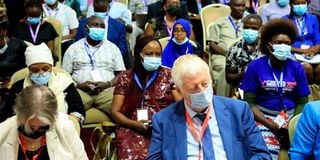Big threat to sexual and reproductive health access

Delegates follow proceedings during the 5th Reproductive Health Network Kenya (RHNK) Annual Scientific Conference on Adolescent and Youth Sexual Reproductive Health and Rights at Sarova Whitesands in Mombasa on June 21, 2022.
Photo by
What you need to know:
- A 2018 Ipsos survey shows nearly half of households earn less than Sh10, 000 a month and two per cent have no income.
- That forces vulnerable and marginalised populations to engage in negative coping strategies—like engagement in transactional sex for food.
- Equal educational, employment and healthcare opportunities for the youth will have a greater impact on the demographic dividend.
Economic stability and healthcare access are closely related. Poor healthcare may affect socioeconomic development and economic instability in healthcare access and its utilisation.
The post-pandemic Kenya continues to suffer high inflation rates with increased food and fuel prices, which might affect the prioritisation of sexual and reproductive health (SRH) at the household level.
A 2018 Ipsos survey shows nearly half of households earn less than Sh10, 000 a month and two per cent have no income.
That forces vulnerable and marginalised populations like adolescents, refugees and residents of informal settlements to engage in negative coping strategies—like high dependency on credit and engagement in transactional sex for food and other basic household needs and education.
Healthcare is often delayed or not sought at all.
Health financing continues to be a major issue amid the economic crisis. Due to the poverty levels, most Kenyans pay for their healthcare despite the NHIF scheme.
While healthcare is devolved, counties receive a measly six per cent of the national Budget and not 15 per cent.
SRH health funding is often donor-dependent, threatening sustainability.
The ripple effect of these financial gaps is that the most vulnerable groups often miss affordable SRH services, even in public facilities, due to stock-outs.
Universal health coverage requires prioritisation of SRH. For sustained social and economic development, the country should adopt sustainable models and innovation that will leverage economic opportunities.
Equal educational, employment and healthcare opportunities for the youth will have a greater impact on the demographic dividend.
The constrained resources call for task shifting in healthcare, including using self-care.
Prioritise subsidies and tax exceptions or reductions on essential household food and medication and streamline SRHR commodity procurement and supply systems.
Prioritise SRH and rights in budget allocations.
Ms Obonyo is a youth project coordinator Reproductive Health Network Kenya. [email protected].





